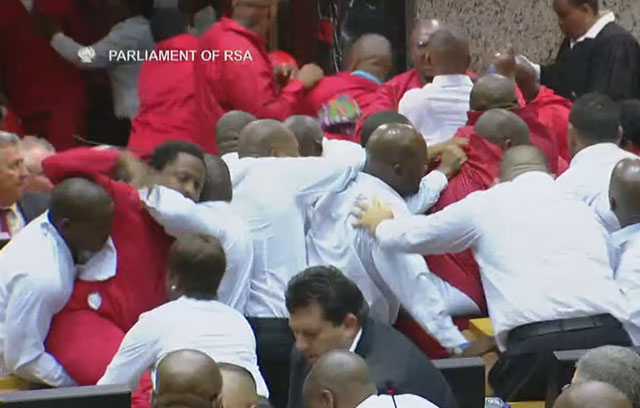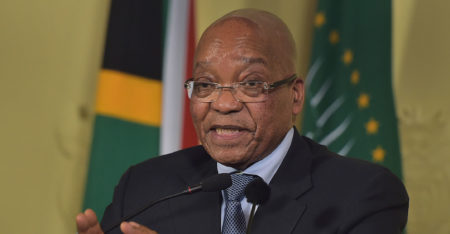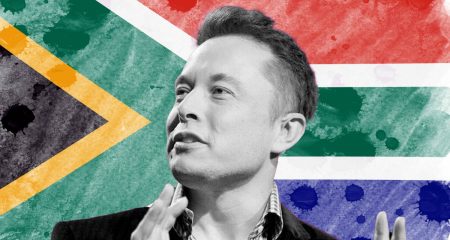
President Jacob Zuma’s annual state-of-the-nation speech descended into chaos as opposition lawmakers brawled with security guards, riot police fired stun grenades outside parliament and rival party supporters clashed in the streets of Cape Town (see video below).
Parliamentary speaker Baleka Mbete summoned the guards to eject members of the Economic Freedom Fighters on Thursday after they repeatedly interrupted proceedings and raised points of order in a bid to stop the president from speaking.
EFF members, wearing their trademark red coveralls and miners’ helmets, shouted “tsotsi” as Zuma entered the chamber, while their counterparts from the ANC tried to drown them out by chanting “president”.
As the security agents moved in to remove them, EFF members engaged in fistfights and swung at them with their helmets before being wrestled from the chamber.
The main opposition party, the Democratic Alliance, and most other opposition groups then walked out of the assembly. Outside parliament, EFF and ANC supporters clashed before being separated by police.
“Parliament has been militarised,” EFF leader Julius Malema said outside the chamber after he was thrown out. “This place has been declared a state of emergency.”
The sight of the legislature being reduced to fistfights and the security clampdown outside showed the growing tensions in South Africa’s democracy that have deepened under Zuma’s controversial administration.
Zuma resumed his speech 80 minutes after he was due to begin, and pledged to engineer a radical overhaul of the economy to tackle poverty and give the black majority a bigger stake in the economy.
“Only 10% of the top 100 companies on the JSE are owned by black South Africans,” he said. “To allow the existing economic forces to retain their interests intact is to feed the roots of racial supremacy and exploitation and does not represent even a shadow of liberation.”
The scope of the security lockdown for Zuma’s speech was unprecedented since the end of apartheid almost 23 years ago. Zuma ordered 441 soldiers to join about 6 000 police to maintain order during his speech. The police erected barricades and closed roads around the legislature, preventing anti-government protesters from approaching the precinct.
The rand weakened as lawmakers and party supporters clashed before paring losses to be little changed at R13,43/US$ by 9.24pm in Johannesburg.
Under Zuma’s presidency, the economy has floundered, with the treasury estimating 0,5% growth last year, and the 27% jobless rate is the highest since 2003. The nation is struggling to retain its investment-grade status at S&P Global Ratings and Fitch Ratings.
Watch the chaos in parliament, followed by Zuma’s state-of-the-nation address:
The ANC suffered its worst electoral performance last year, when it lost control of Pretoria, the capital, and the economic hub of Johannesburg. While Zuma has said he’ll step down as head of the ANC in December, his term as president continues until 2019.
The EFF repeated its charge that Zuma, 74, was no longer a legitimate president after the nation’s top court ruled last year that he violated the constitution by not obeying an order by the nation’s graft ombudsman to repay state money spent to renovate his private residence. The ANC has used its 62% majority in parliament to shield him from opposition motions to impeach him.
Zuma was also implicated in another report released by the ombudsman last year, which implied that he allowed members of a wealthy family who are in business with his son to influence cabinet appointments and the issuing of state contracts. Zuma has denied ever intentionally breaking the law and has challenged the report in court.
The president’s approval rating has slumped to four out of 10, from 5,7 in November 2014, a survey of 3 416 South African adults conducted by research company Ipsos between 25 October and 28 November for broadcaster eNCA that was released on Wednesday showed. — (c) Bloomberg LP
- Reported with assistance from Mike Cohen, Alastair Reed and Rene Vollgraaff




